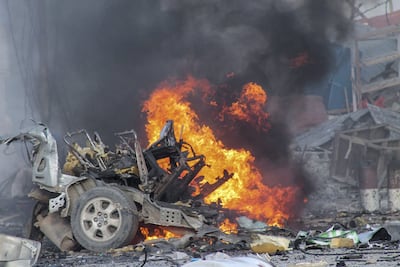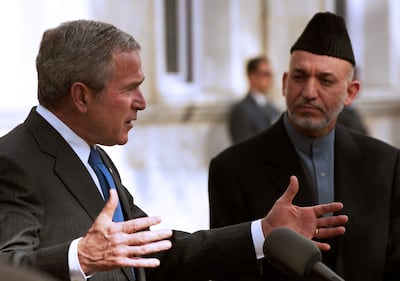A jet from the US-led coalition to defeat ISIS shot down a drone in eastern Syria on Saturday. On Monday, the coalition said it had facilitated the capture of what it described as a key terrorist in Deir Ezzor by its Kurdish-led allies on the ground.
In Africa, Al Shabab fighters reportedly stormed a military base in the centre of Somalia on Tuesday and recaptured a town it had lost to government forces earlier this month. The same day, Al Qaeda-linked group also claimed the deadly suicide bombing of a cafe in the Somali capital, Mogadishu.
The US military has been expanding air strikes against Al Shabab over the summer, who themselves have intensified attacks in Somalia since about 700 American military personnel were withdrawn from there at the start of this year.
Even as chaos grips Kabul, from where US-led forces are completing their withdrawal, Washington is on the front foot against terror groups.
When explaining his rationale for the withdrawal of American combat presence from Afghanistan, President Joe Biden put Al Shabab – as well as others such as ISIS – on notice of the continued willingness of the US to act against them no matter where they are.
“Today, the terrorist threat has metastasised well beyond Afghanistan: Al Shabab in Somalia, Al Qaeda in the Arabian Peninsula, Al Nusra in Syria, ISIS attempting to create a caliphate in Syria and Iraq and establishing affiliates in multiple countries in Africa and Asia. These threats warrant our attention and our resources,” Mr Biden said.
Mr Biden made these remarks last week when he gave his response to the speed with which the Taliban were able to take over the country. He also underlined that they are not in the same bracket as the others – while the Taliban are subject to economic and financial sanctions from Washington, they are not officially listed as a terror group by the US.

Mr Biden has in any case seemingly alerted the world to a new phase in the US’s so-called war on terror, waged at differing levels of urgency since the September 11, 2001 attacks on New York, carried out by members of Osama bin Laden's Al Qaeda group. He argued that the US carries out “effective counterterrorism missions” in countries where it does not have a permanent military presence.
“If necessary, we will do the same in Afghanistan,” he said in reference to concerns over a resurgence of Al Qaeda and ISIS as a result of the vacuum left behind there.

Repeatedly, Mr Biden referred to not losing focus on the threat to the US from terror groups. The war on terror has never really relented. Rather, it is the semantics used in discussions about it that have evolved. The "war on Al Qaeda" became the war on terror before this label gave way to a broader mission statement.
For example, in 2005, The New York Times reported Gen Richard Myers, chairman of the Joint Chiefs of Staff, saying that he had "objected to the use of the term 'war on terrorism' before, because if you call it a war, then you think of people in uniform as being the solution". He also said the threat should be defined as violent extremism, with the recognition that "terror is the method they use". Around that time, senior officials in the US administration led by George W Bush, including then defence secretary Donald Rumsfeld, also modified their language.
Efforts to neutralise Al Shabab may also point the way when it comes to understanding what future American military engagement around the world will look like. Al Shabab have been active in Somalia since 2006 and, according to US Africa Command, are now the largest and most active force associated with Al Qaeda in the world. “They have been and remain a very real and serious threat to the Somali people and they are the primary African violent extremist threat to American interests,” it said.
Fatalities linked to Al Shabab attacks are projected to rise by 16 per cent this year, and the number of battles with Somali security forces by 28 per cent, according to research from the US Department of Defence, according to a Bloomberg report. Al Shabab’s posturing statement in the wake of the Taliban victory in Afghanistan provides evidence of an unwillingness to scale back its attacks. We should expect the same attitude from terror groups in Iraq, Yemen and Syria now. The US will then have to respond and similarly step up its own operations to stop them.
While there may ultimately be fewer American troops in these countries, the reality is that this particular “forever war” – a phrase Mr Biden has repeatedly used to describe US engagement in Afghanistan and Iraq – is set to go on and on.


